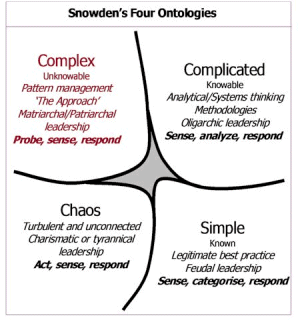Problem Solving
In a series of fascinating blog posts Dave Pollard has clarified for me ‘problem solving’ in ways that are informed by systems thinking, complexity science... and more holistic or integral approaches.While many curriculum and syllabus documents nominate ‘problem solving’ as an important skill for students very few appear to describe this beyond simple problem-answer processes. Some have begun to refer to ‘problem posing’, ‘problem prevention’ and ‘problem solving’ - and the importance of using ‘systems thinking’ and ‘higher order thinking’ - but Pollard now makes me think we could be much more explicit about some of these processes…
I think many students and teachers will find his approach very useful.

Dave Snowden describes four categories (ontologies) of systems each requiring different methods and tools for effective intervention. Using references from Pollard and Snowden:
Simple systems can be ‘known’. Within known limits we can predict the behaviour of the system and there is one clear ‘best practice’ for solving problems or making corrections. Effective methodologies: Sense, categorise and respond. These systems can be easily modeled are most suited to automation.
Complicated systems have many inter-relationships but they can be discovered. Methodologies can be developed following sufficient analysis to intervene in the system to achieve desired changes or corrections. Senge's 'systems thinking' and ‘system dynamics software’ are useful tools for dealing with complicated systems, where cause and effect is not obvious or simple, but is knowable. Effective methodologies: Sense, analyse and respond.
Complex systems have no knowable cause and effect relationships – there are just too many. Instead we need to focus on the management of patterns and the unpredictable emergence of new properties. Pollard calls these ‘wicked problems’. When analysis and subsequent solutions fail to solve a problem, or predict behaviour, it's often because approaches meant for complicated systems have been used to address complex ones. Effective methodologies: Probe, sense and respond.
A different approach is required. One that uses discovery (probing) rather than analysis, with an acknowledgment that not all can be known. Open Space Technology is one method that considers possibilities and options. It’s about knowledge-sharing and ideation of conversations rather than simply implementing an action plan. It’s about powerful learning, collaboration, and doing. Pollard also calls this ‘appreciative inquiry’.
Chaotic systems are turbulent with disrupted relationships. They require crisis management. However they can also be very useful and even necessary to move from one undesirable complex system to another more desirable one. Effective methodologies: Act, sense and respond.
If we are empowering students to be active participants as local and global citizens then they will surely need an understanding of the difference between simple, complicated, complex and chaotic systems. If we as educators are attempting to change educational systems we will need the same understanding.
Labels: systems




0 Comments:
Post a Comment
<< Home